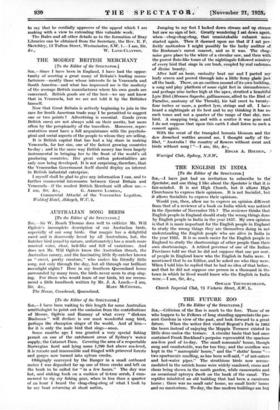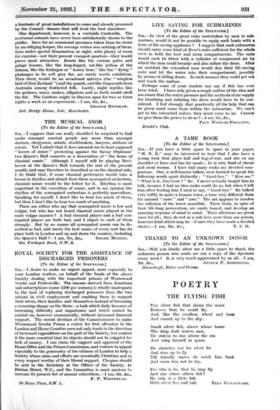THE FUTURE ZOO [To the Editor of the SPECTATOR.]
Sue,—Criticism of the Zoo is much to the fore. Those of us who happen to be Fellows of long standing appreciate the pre- sent Gardens in view of the past, and look forward to a great future. When the writer first visited Regent's Park in 1882 the bears instead of enjoying the Mappin Terraces'existed in little dens under- the terrace. A circular basin that had once contained Frank Buckland's porpoise representhl the spacious sea-lion pool of to-day. The small mammals' house, though snug and comfortable, was far too tiny, and the overflow was. kept in the " marsupials' house," and the " sloths' house "- two apartments smelling, as has been well said, " of ant-eaters and hot-water pipes." The struthious birds now accom- modated in the ostrich house were widely sundered, emus and rheas being shown in the south garden, while cassowaries and, an occasional apteryx dwelt on the bank of the canal. The; reptiles inhabited an old building that had been a carnivore house ; there was no small cats' house, no small birds' house and no sanatorium. To-day, the fine modern buildings are but a foretaste of great installations to come and already promised by the Council—houses that will rival the best elsewhere.
One department, however, is a veritable Cinderella. The nocturnal animals have never been satisfactorily shown to the public. Save for an occasional specimen taken from its straw by an obliging keeper, the average visitor sees nothing of them. Seen under special illumination at night, with plenty of room for exercise—not their present cramped quarters—they would prove most attractive. Beasts like the curious potto and galage lemurs, like the long-legged, rat-like jerboa of the Sahara, like the kinkajou or " honey bear," like the " flying " phalanger in its soft grey fur, are surely worth exhibition. Then there, would be an occasional apteryx (the " wingless bird of New.Zeahuid ") and the quaint, owl-like frogmouth from Australia among feathei.ed folk. Lastly, night reptiles like the geckoes, many snakes, alligators and so forth would swell the list. The Gardens might be thrown open for two or three nights a week as an experiment.—I am, Sir, &c.,
GRAHAM RENSHAW.
Sale Bridge House, Sale, Manchester.















































 Previous page
Previous page